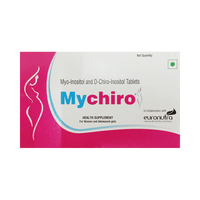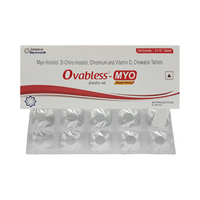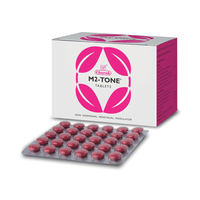Rs.39.90for 1 strip(s) (10 tablets each)
food interaction for Gestoserv M Tablet
alcohol interaction for Gestoserv M Tablet
pregnancy interaction for Gestoserv M Tablet
lactation interaction for Gestoserv M Tablet
food
alcohol
pregnancy
lactation
Gestoserv M 10mg Tablet may be taken with or without food.
None
None
CAUTION
Alcohol should be used with caution while taking Gestoserv M 10mg Tablet.
CAUTION
Gestoserv M 10mg Tablet is highly unsafe during pregnancy. It can cause serious harm to the unborn baby, including birth defects and pregnancy loss. Do not use this medicine if you are pregnant or planning to become pregnant.
UNSAFE
Gestoserv M 10mg Tablet may be unsafe to use during breastfeeding. Limited human data suggests that the drug may pass into the breastmilk and harm the baby. It should be used only if the expected benefit outweighs the potential risk. Please consult your doctor.
CONSULT YOUR DOCTOR
SALT INFORMATION FOR Gestoserv M 10mg Tablet
Medroxyprogesterone acetate(10mg)
Gestoserv m tablet uses
How gestoserv m tablet works
Gestoserv M 10mg Tablet is a progestin (female hormone). It works by replacing the natural progesterone hormone that the body is unable to make. This treats painful, irregular, or absent menstrual periods. It also prevents an overgrowth of the lining of the uterus in menopausal women taking estrogen (another female hormone).
Common side effects of gestoserv m tablet
Headache, Abdominal pain, Breast pain, Irregular vaginal bleeding, Nausea, Vomiting, Hair loss, Edema (swelling), Vaginal yeast infection
SUBSTITUTES FOR Gestoserv M Tablet
82 Substitutes
82 Substitutes
Sorted By
 Rs. 65.48pay 55% more per Tablet
Rs. 65.48pay 55% more per Tablet Rs. 56.25pay 38% more per Tablet
Rs. 56.25pay 38% more per Tablet Rs. 66.70pay 67% more per Tablet
Rs. 66.70pay 67% more per Tablet Rs. 65.51pay 61% more per Tablet
Rs. 65.51pay 61% more per Tablet Rs. 65.52pay 64% more per Tablet
Rs. 65.52pay 64% more per Tablet
Expert advice FOR Gestoserv M Tablet
- Medroxyprogesterone acetate may cause bleeding or spotting in between menstrual periods. Let your doctor know if this occurs frequently.
- Stop taking Medroxyprogesterone acetate and inform your doctor immediately if you get severe headaches, stabbing pains, or swelling in one leg; pain in breathing; sudden changes in your vision or hearing; or yellowing of your skin or whites of your eyes.
- Use a non-hormonal method of contraception, such as condoms, to prevent pregnancy while you are taking this medication.
- Do not take Medroxyprogesterone acetate if you are pregnant or breastfeeding, have unusual vaginal bleeding, or have a history of blood clots, stroke, heart attack, liver problems, or bleeding problems.
Frequently asked questions FOR Gestoserv M 10mg Tablet
Medroxyprogesterone acetate
Q. How does Gestoserv M 10mg Tablet work? What is it used for?
Gestoserv M 10mg Tablet works similarly to the progesterone hormone naturally produced by the body. It helps in regulating the periods, stopping irregular bleeding, and controlling the withdrawal bleeding in case of amenorrhea (unusual stopping of menstrual periods). It is also used to prevent endometrial hyperplasia (thickening of the lining of the uterus).
Q. When and how to take Gestoserv M 10mg Tablet?
Take it strictly as advised by your doctor. The number of doses and the duration will depend on the medical problem you are being treated for. You can take it with or without food, preferably at the same time each day to ensure consistent levels of medicine in your body.<br>
Q. What are the common side effects which I can experience while taking Gestoserv M 10mg Tablet?
The common side effects of Gestoserv M 10mg Tablet include headache, nausea (feeling sick), weight gain, breast pain, and unusual vaginal bleeding or spotting. Do not worry, most of these symptoms are temporary. However, if they persist, check with your doctor as soon as possible.























